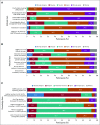National Survey of Oncologists at National Cancer Institute-Designated Comprehensive Cancer Centers: Attitudes, Knowledge, and Practice Behaviors About LGBTQ Patients With Cancer
- PMID: 30650044
- PMCID: PMC6553841
- DOI: 10.1200/JCO.18.00551
National Survey of Oncologists at National Cancer Institute-Designated Comprehensive Cancer Centers: Attitudes, Knowledge, and Practice Behaviors About LGBTQ Patients With Cancer
Abstract
Purpose: To identify potential gaps in attitudes, knowledge, and institutional practices toward lesbian, gay, bisexual, transgender, and queer/questioning (LGBTQ) patients, a national survey of oncologists at National Cancer Institute-Designated Comprehensive Cancer Centers was conducted to measure these attributes related to LGBTQ patients and desire for future training and education.
Methods: A random sample of 450 oncologists from 45 cancer centers was selected from the American Medical Association's Physician Masterfile to complete a survey measuring attitudes and knowledge about LGBTQ health and institutional practices. Results were quantified using descriptive and stratified analyses and by a novel attitude summary measure.
Results: Of the 149 respondents, there was high agreement (65.8%) regarding the importance of knowing the gender identity of patients, which was contrasted by low agreement (39.6%) regarding the importance of knowing sexual orientation. There was high interest in receiving education regarding the unique health needs of LGBTQ patients (70.4%), and knowledge questions yielded high percentages of "neutral" and "do not know or prefer not to answer" responses. After completing the survey, there was a significant decrease ( P < .001) in confidence in knowledge of health needs for LGB (53.1% agreed they were confident during survey assessment v 38.9% postsurvey) and transgender patients (36.9% v 19.5% postsurvey). Stratified analyses revealed some but limited influence on attitudes and knowledge by having LGBTQ friends and/or family members, political affiliation, oncology specialty, years since graduation, and respondents' region of the country.
Conclusion: This was the first nationwide study, to our knowledge, of oncologists assessing attitudes, knowledge, and institutional practices of LGBTQ patients with cancer. Overall, there was limited knowledge about LGBTQ health and cancer needs but a high interest in receiving education regarding this community.
Figures




References
-
- Lisy K, Peters MDJ, Schofield P, et al. : Experiences and unmet needs of lesbian, gay, and bisexual people with cancer care: A systematic review and meta-synthesis. Psychooncology 27:1480-1489, 2018 - PubMed
-
- Matthews AK, Breen E, Kittiteerasack P: Social determinants of LGBT cancer health inequities. Semin Oncol Nurs 34:12-20, 2018 - PubMed
Publication types
MeSH terms
Grants and funding
LinkOut - more resources
Full Text Sources

